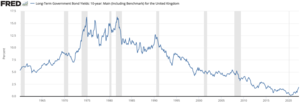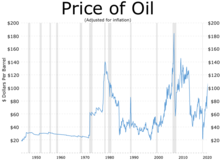
Leonard James Callaghan, Baron Callaghan of Cardiff,, commonly known as Jim Callaghan, was a British politician who served as Prime Minister of the United Kingdom from 1976 to 1979 and Leader of the Labour Party from 1976 to 1980. Callaghan is the only person to have held all four Great Offices of State, having served as Chancellor of the Exchequer from 1964 to 1967, Home Secretary from 1967 to 1970 and Foreign Secretary from 1974 to 1976. He was a member of Parliament (MP) from 1945 to 1987.

Denis Winston Healey, Baron Healey was a British Labour Party politician who served as Chancellor of the Exchequer from 1974 to 1979 and as Secretary of State for Defence from 1964 to 1970; he remains the longest-serving Defence Secretary to date. He was a Member of Parliament from 1952 to 1992, and was Deputy Leader of the Labour Party from 1980 to 1983. To the public at large, Healey became well known for his bushy eyebrows, his avuncular manner and his creative turns of phrase.
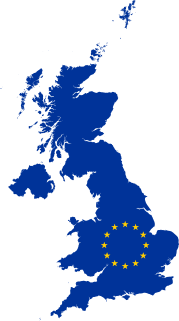
Black Wednesday occurred on 16 September 1992 when the UK Government was forced to withdraw the pound sterling from the European Exchange Rate Mechanism (ERM), after a failed attempt to keep the pound above the lower currency exchange limit mandated by the ERM. At that time, the United Kingdom held the Presidency of the Council of the European Union.

Sterling is the official currency of the United Kingdom and its associated territories.
Rational Machines was founded by Paul Levy and Mike Devlin in 1981 to provide tools to expand the use of modern software engineering practices, particularly explicit modular architecture and iterative development. It changed its name in 1994 to Rational Software, and was sold for US$2.1 billion to IBM on February 20, 2003.
The Bretton Woods system of monetary management established the rules for commercial and financial relations among the United States, Canada, Western European countries, Australia, and Japan after the 1944 Bretton Woods Agreement. The Bretton Woods system was the first example of a fully negotiated monetary order intended to govern monetary relations among independent states. The Bretton Woods system required countries to guarantee convertibility of their currencies into U.S. dollars to within 1% of fixed parity rates, with the dollar convertible to gold bullion for foreign governments and central banks at US$35 per troy ounce of fine gold. It also envisioned greater cooperation among countries in order to prevent future competitive devaluations, and thus established the International Monetary Fund (IMF) to monitor exchange rates and lend reserve currencies to nations with balance of payments deficits.
In macroeconomics and modern monetary policy, a devaluation is an official lowering of the value of a country's currency within a fixed exchange-rate system, in which a monetary authority formally sets a lower exchange rate of the national currency in relation to a foreign reference currency or currency basket. The opposite of devaluation, a change in the exchange rate making the domestic currency more expensive, is called a revaluation. A monetary authority maintains a fixed value of its currency by being ready to buy or sell foreign currency with the domestic currency at a stated rate; a devaluation is an indication that the monetary authority will buy and sell foreign currency at a lower rate.

The Şükrü Saracoğlu Stadium is a football stadium located in the Kadıköy district of Istanbul, Turkey. It is the traditional home venue of major Turkish multi-sport club Fenerbahçe SK. The stadium was inaugurated in 1908 and renovated between 1929 and 1932, 1965 and 1982, and 1999 and 2006. On 4 October 2006, after numerous inspections by UEFA, Ülker Stadium was selected to host the 2009 UEFA Cup Final that went down to history as the last Final of the UEFA Cup football tournament, which was rebranded as the UEFA Europa League starting from the 2009–10 season.
Chronic inflation is an economic phenomenon occurring when a country experiences high inflation for a prolonged period due to continual increases in the money supply among other things. In countries with chronic inflation, inflation expectations become 'built-in', and it becomes extremely difficult to reduce the inflation rate because the process of reducing inflation by, for example, slowing down the growth rate of the money supply, will often lead to high unemployment until inflationary expectations have adjusted to the new situation.

Edmunds Center is a 5,000-seat multi-purpose arena at Stetson University in DeLand, Florida, that opened on December 5, 1974. It is home to the Stetson Hatters basketball team. The arena is named after J. Ollie Edmunds, fourth president of Stetson University (1948-1967).
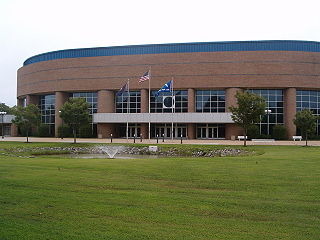
Hampton Convocation Center is a 7,200-seat multi-purpose arena in Hampton, Virginia. It was built in 1993 and is home to the Hampton University Pirates basketball team. The arena replaced Holland Hall gymnasium, which holds women's volleyball matches and tournaments. The construction cost was about $4 million-$5 million.

Sojka Pavilion is a 4,000-seat multi-purpose arena in Lewisburg, Pennsylvania. It was built in 2003 and is home to the Bucknell University Bison basketball teams, replacing nearby Davis Gym. It is named for Dr. Gary Allan Sojka, a former president of the university who remained at the university as a professor of biology after the end of his term, until his retirement in 2006. It features locker rooms, a hardwood playing surface, concession stands, LED video boards, a team store, and a Jumbotron.

The Beautiful World Tour 2007 was the sixth concert tour for the British pop group Take That. The tour ran from 11 October to 31 December 2007, with fifty stops in ten European countries.
Bailey Memorial Stadium is a 6,500-seat multi-purpose stadium in Clinton, South Carolina. It is home to the Presbyterian College Blue Hose football team. The facility opened in 2002. The playing surface is named Claude Crocker Field. The facility features a multi-level press box, a spacious field house and concession stands for home and visiting fans.

Physical Education Complex is a 4,100-seat multi-purpose arena in Baltimore, Maryland. It was built in 2009 and became home to the Coppin State University men's basketball team in the 2009–2010 season. The women's basketball team and women's volleyball team also play at the facility. The arena replaced the Coppin Center.

The United Kingdom national debt is the total quantity of money borrowed by the Government of the United Kingdom at any time through the issue of securities by the British Treasury and other government agencies.

The Strand Theatre is a multi-use performing arts and film center in Marietta, Georgia, United States. Originally built in 1935 by the Manning-Winks Theatre Company as an art deco movie palace, it is currently the home of the Earl and Rachel Smith Strand Theatre, a nonprofit arts organization specializing in live theatre, classic movies, concerts, comedy, and other special events.
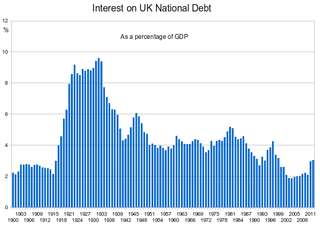
The history of the British national debt can be traced back to the reign of William III, who engaged a syndicate of City traders and merchants to offer for sale an issue of government debt, which evolved into the Bank of England. In 1815, at the end of the Napoleonic Wars, British government debt reached a peak of £1 billion.

The Chevrolet Light Six Series L was an American car produced by Chevrolet in 1914 and 1915. The famous Chevrolet 'Bow Tie' emblem made its grand debut in 1914, and has been used on all Chevrolet cars and trucks since then. When the Classic Six ceased production at the end of the 1914 model year the Light Six replaced it in 1915 as Chevrolet's top-of-the-line car.

Old Warson Country Club is a country club located in St. Louis, Missouri. Founded in 1953, it hosted the 1971 Ryder Cup and the 2009 U.S. Women's Amateur Golf Championship. The golf course was designed by Robert Trent Jones.


